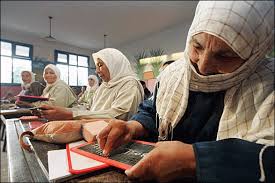Illiteracy in the Arab World

The progress of any nation is measured in several ways: health care, infrastructure, freedoms and education, and the rates of all the above in the Arab countries are low compared to the developed countries taking into consideration the differences of course. We can not compare the infrastructure in the UAE or Qatar infrastructure in Egypt or Sudan, Nor freedoms in a state like Kuwait in a state like Saudi Arabia as well.
Article 26 of the Universal Declaration of Human Rights states that everyone has the right to education, that education must be at its first and basic stage at least free, that primary education is compulsory, that technical and vocational education should be generalized and that admission to higher education should be made equally accessible to all On the basis of efficiency.
The illiteracy rate in the Arab world is about 19 percent, while it is almost fading in the developed countries, or the so-called world's first countries.
Education is one of the most important pillars of building human civilization throughout the ages. It is the reason for the success of many nations. Singapore, for example, was a poor country with high illiteracy. It has become one of the most important countries in the world in terms of economic competitiveness. Its independence from Malaysia in 1965 was based on various policies and initiatives that would gradually improve all aspects of the educational process: improving and improving curricula, raising teachers' wages and building schools, which led to a higher level of education in quantity and quality, State and its rapid growth.
On the other hand, the problems of education are multiple and complex in the Arab world. For example, the illiteracy rate in the Arab world is about 19 percent, while it is almost fading in the developed countries, or the so-called first world countries. The teacher's income is also one of the lowest-income jobs in the Arab world, while Canada's highest monthly salary is $ 5733, followed by Italy, India and America, according to the University of Chicago's Center for Higher Education Research.
It is also noted that the number of schools and the availability of facilities and tools is limited, and is almost nonexistent in some less fortunate areas of the Arab world. The university education suffers from many disadvantages and problems that are endless: starting with the high costs, through the foot of the curriculum and decisions, and the lack of compatibility of outputs with the labor market.
It should be noted that females in the Arab countries have a lower chance of education in males, especially university education, where they are deprived of it for reasons of customs and traditions, and sometimes misinterpretation of religion.
I do not think that the backwardness of the Arab countries is due only to the weakness of education, but I think that education is a cornerstone of the revival of any nation that wishes to rise. I also think that many politicians in Arab countries do not want to advance their countries deliberately for fear of their power and personal benefits. If available, I would recommend reviewing the Global Competitiveness Report 2015 to see why Finland is the most powerful country in the world
goood
Thanks
Thanks you and good job brother
Good job keep going
Big up Bro